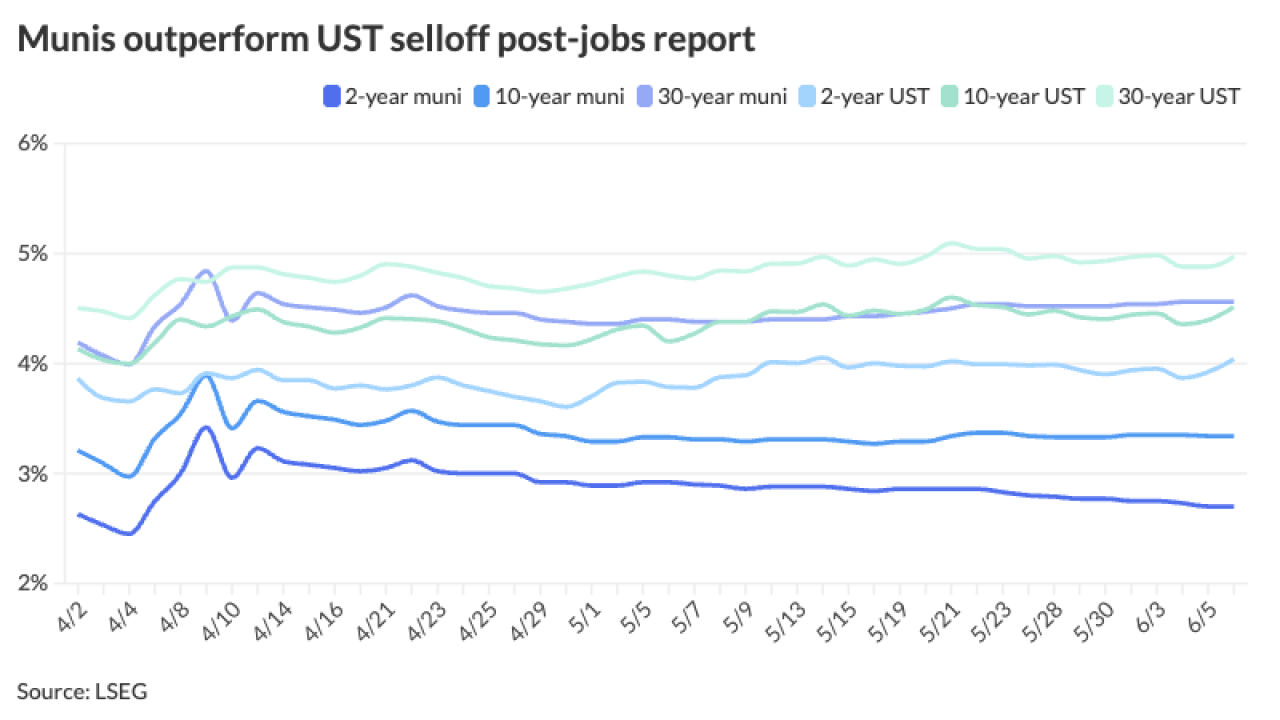DALLAS — Annual payments to states under the terms of the 1998 Master Settlement Agreement were $814 million lower than the $6.5 billion originally expected this year because tobacco companies either withheld part of their expected payments or did not make their payments on time, according to documents obtained by The Bond Buyer.
A summary of 2006 payments compiled by MSA auditor PricewaterhouseCoopers LLP states that 13 tobacco companies opted to withhold part of their payments or place them in escrow because of market share loss in 2003 to manufacturers that did not sign the agreement.
The report states that Citibank NA will maintain the so-called disputed payments account.
Last week, officials from R.J. Reynolds Tobacco Co. announced that the company sent a payment to states for nearly $1.36 billion, but placed an additional $646.7 million into the dispute account. Officials from Lorillard Tobacco Co. sent a $557.5 million payment to states, but had placed $108.5 million into a dispute account.
According to PwC’s report, dated April 20, 10 additional companies either withheld money or placed some into the disputed payments account.
The companies placing funds into escrow are: Commonwealth Brands Inc., which made a $201 million payment, but placed an additional $24.3 million into escrow; Japan Tobacco International U.S.A., which made a $1.7 million payment, but placed $287,359 into escrow; King Maker Marketing Inc., which made a $3.4 million payment, but placed $492,496 into escrow; Konci G&D Management, which made a $583,907 payment, but placed $71,778 into escrow; Kretek International, which made a $1.04 million payment, but withheld $139,334; Liberty Brands LLC, which made a $5.1 million payment, but withheld $606,441; P.T. Djarum, which made a $3.8 million payment, but withheld $434,666; and Sherman 1400 Broadway N.Y.C. Inc., which made a $644,719.41 payment, but withheld $89,877.
The companies withholding money this year were General Tobacco Co., which made a $96 million payment to states, but withheld $11.6 million, and Liggett Group, which made a $10.6 million payment, but withheld $4.2 million.
M/s Dhanraj International sent a $500,000 payment to states last week, but told state attorneys general that the company does not plan to make additional payments at this time.
In addition, International Tobacco Group, which owes states $74,171, sent correspondence to MSA officials indicating that it would make its payment in two to eight weeks. Virginia Carolina Corp. also informed MSA participants that it would make its payment late — in two to four weeks, according to the PwC report.
A note on the report indicates that officials understand that Bekenton SA is in bankruptcy and will be “out of business soon.”
Companies making their full MSA payments this year were Philip Morris USA ($3.4 billion); Cutting Edge Enterprises ($95,906); Daughters & Ryan Inc. ($225,514); Farmers Tobacco Co. ($19.4 million); House of Prince A/S ($25,201); Lane Ltd. ($2.8 million); Lignum-2 Inc. ($388,725); Mac Baren Tobacco Co. ($20,271); Pacific Stanford Manufacturing Co. ($203,713); Peter Stokkebye International A/S ($2.6 million); Santa Fe Natural Tobacco Co. ($14.3 million); Top Tobacco LP ($15.4 million); U.S. Flue-Cured Tobacco Growers Inc. ($365,423); Von Eiken Group ($94,466); and Wind River Tobacco Co. ($32,902).
Some analysts had speculated last week that all tobacco companies with the exception of Philip Morris had actually withheld part of their payments this year. However, they were quick to point out the need for such speculation because state attorneys general do not allow the general public access to detailed information about MSA payments.
Had all of the tobacco companies, including Philip Morris, that signed on to the MSA invoked the so-called NPM adjustment — named for tobacco companies that do not make MSA payments, called non-participating manufacturers — several tobacco bond issuers would have been forced to tap debt service reserves to meet interest and principal payments this year. Even with the relatively small hit to the MSA payments this year, a number of tobacco bond issuers will not be able to redeem as many turbo bonds as they’d originally planned.
According to the terms of the MSA, tobacco companies may reduce their annual MSA payments — via withholding or placing funds in escrow — if they lose more than 2% market share during any year to companies that did not sign the agreement, called non-participating manufacturers.
Escrowed funds are to be held pending a determination about whether each participating state has “diligently enforced” non-compete statutes mandated by the MSA. Those statutes require NPMs to make annual payments into state-overseen escrow funds that would be tapped if those companies were ever sued for the cost of caring for sick smokers.
If states are found to have met the demands of diligent enforcement, their share of the annual MSA payments would be released from escrow and sent to them. Those states that are found not to have complied with the statute requirement would lose their annual payment.
Payments for those states that are not found to have diligently enforced statutes would be returned to the tobacco companies.
Companies that withheld part of their MSA payments would be required to pay states, with interest, if they lose the NPM determination.





